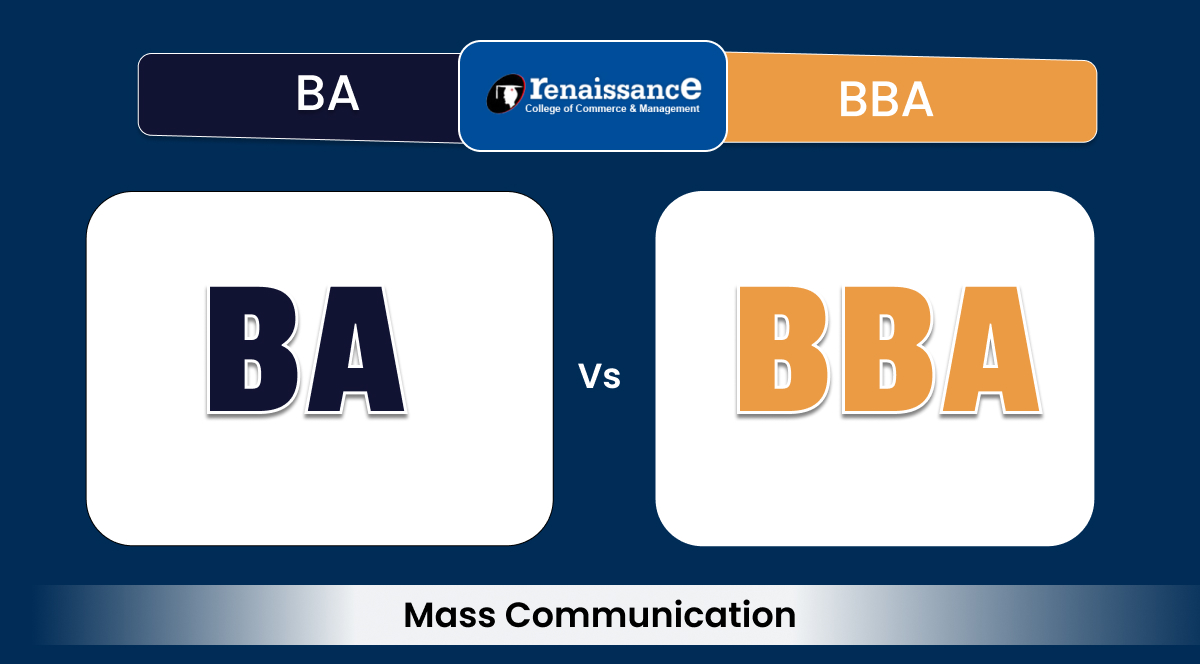BBA vs BA in Mass Communication : Choosing the Right Path for a Career in Communication
Introduction:
In today’s interconnected world, effective communication has become a crucial skill in various professional fields. Whether it’s in marketing, public relations, journalism, or corporate communication, a solid educational foundation in communication is essential. For individuals aspiring to pursue a career in the communication industry, higher education plays a vital role in acquiring the necessary knowledge and skills. Two popular academic programs in the field of communication are the Bachelor of Business Administration (BBA) in Mass Communication and the Bachelor of Arts (BA) in Communication. In this blog post, we will compare and contrast these two programs to help aspiring students make an informed decision about their educational path and career aspirations. By examining the core subjects, career prospects, and unique features of each program, we can shed light on the different aspects of BBA in Mass Communication and BA programs in communication.
Understanding BBA in Mass Communication:
A. Definition and scope of BBA in Mass Communication:
- BBA in Mass Communication is an undergraduate program that combines the principles of business administration with the study of mass communication.
- It focuses on developing a strong foundation in both communication theories and business management practices.
B. Core subjects and coursework offered in BBA in Mass Communication:
- The curriculum typically includes courses in mass media, journalism, public relations, advertising, marketing, organizational communication, and media management.
- Students also study core business subjects such as marketing management, financial management, human resource management, and strategic management.
- Practical training is often provided through internships, projects, and workshops to enhance communication skills and business acumen.
C. Emphasis on business and managerial skills in addition to communication:
- BBA in Mass Communication program equips students with a blend of communication expertise and business knowledge, preparing them for managerial roles in the communication industry.
- Students develop skills in media planning, budgeting, market research, strategic communication planning, and project management.
- They learn how to apply business principles to the communication field, enabling them to navigate the dynamic media landscape effectively.
D. Career prospects and opportunities for BBA in Mass Communication graduates:
- BBA in Mass Communication graduates can pursue diverse career paths in the communication industry.
- They may find opportunities in advertising agencies, media houses, public relations firms, corporate communication departments, digital marketing agencies, and media planning and buying organizations.
- Job roles may include communication manager, public relations specialist, media planner, marketing executive, content strategist, digital media analyst, or event manager.
- With their combined knowledge of communication and business, BBA in Mass Communication graduates are well-positioned to take on leadership positions and contribute to the strategic decision-making processes in their organizations.
By offering a unique combination of communication and business education, BBA in Mass Communication programs provide students with a solid foundation to thrive in the dynamic and competitive communication industry. The integration of business skills enhances their career prospects and opens up a wide range of opportunities in various sectors related to media and communication.
Exploring BA in Communication:
A. Overview of BA in Communication as a broader academic program:
- BA in Communication is a comprehensive undergraduate program that focuses on the study of various aspects of communication.
- It offers a broader understanding of communication theories, practices, and societal implications across different contexts.
B. Focus on theoretical and practical aspects of communication:
- BA in Communication curriculum emphasizes the theoretical foundations of communication, including interpersonal communication, mass communication, organizational communication, and cultural communication.
- Students explore various communication models, theories, and frameworks to analyze and understand the complexities of human communication.
- Practical components of the program may include public speaking, media production, journalism, writing for media, and research methodologies.
C. Coursework and specialization options available in BA in Communication:
- The coursework in BA in Communication covers a wide range of subjects, including media studies, communication ethics, intercultural communication, rhetoric, persuasion, and communication research.
- Students can choose to specialize in specific areas such as journalism, digital media, public relations, film studies, or strategic communication, depending on the offerings of the program and their interests.
D. Potential career paths for BA in Communication graduates:
- BA in Communication graduates have diverse career opportunities in various sectors.
- They can pursue careers in journalism, public relations, advertising, digital media, corporate communication, non-profit organizations, government agencies, or research and academia.
- Job roles may include communication specialist, media coordinator, content creator, social media manager, public affairs officer, market researcher, or communication consultant.
- BA in Communication graduates often excel in roles that require strong communication skills, critical thinking, research abilities, and an understanding of media dynamics.
BA in Communication programs provide students with a comprehensive understanding of the principles and practices of communication in a wide range of contexts. The emphasis on theoretical knowledge and critical analysis equips graduates with a solid foundation to adapt to the evolving communication landscape and contribute to various industries that rely on effective communication strategies.
IV. Differentiating Factors:
A. Business and management skills in BBA in Mass Communication:
- One key differentiating factor of BBA in Mass Communication is the incorporation of business and management skills into the curriculum.
- Students gain knowledge in areas such as marketing, finance, strategic management, and human resources, which provides them with a broader understanding of the business side of the communication industry.
- This combination of communication and business skills prepares graduates for managerial roles and positions that require a strategic perspective.
B. Depth of theoretical knowledge in BA in Communication:
- BA in Communication programs often offer a more extensive exploration of theoretical frameworks and concepts related to communication.
- Students delve into various communication theories, research methodologies, and critical analysis of media and society.
- This focus on theoretical knowledge allows graduates to develop a deeper understanding of the underlying principles and social implications of communication.
C. Internship and practical experiences in both programs:
- Both BBA in Mass Communication and BA in Communication programs typically offer opportunities for internships and practical experiences.
- BBA in Mass Communication programs may emphasize internships in business or corporate settings, providing hands-on experience in areas like marketing, advertising, or media management.
- BA in Communication programs may offer internships in media organizations, public relations firms, or journalism outlets, allowing students to gain practical skills in their chosen specialization.
D. Potential career prospects and industry preferences for each program:
- BBA in Mass Communication graduates may find more opportunities in management positions within media organizations, advertising agencies, or corporate communication departments.
- BA in Communication graduates, with their strong theoretical foundation, may excel in roles that require critical thinking, research, and creative communication strategies.
- The career paths for each program may vary based on industry preferences, with BBA in Mass Communication graduates often pursuing roles that require a combination of business acumen and communication skills, while BA in Communication graduates may lean towards roles that emphasize research, analysis, and creative storytelling.
Considering these differentiating factors can help individuals make an informed decision when choosing between BBA in Mass Communication and BA in Communication programs. It is crucial to align personal interests, career goals, and desired skill sets to select the program that best suits individual aspirations in the field of communication.
V. Factors to Consider in Choosing the Right Program:
- Career Goals: Consider your desired career path and the specific roles you aspire to in the communication industry. Assess whether you are more interested in managerial positions that require a combination of business and communication skills (BBA in Mass Communication) or if you prefer a broader understanding of communication theories and practices (BA in Communication).
- Skill Set: Evaluate your strengths and interests. If you have a passion for business and enjoy strategic thinking, problem-solving, and leadership, BBA in Mass Communication may be a better fit. If you have a strong inclination towards research, analysis, and creative communication, BA in Communication might align more with your skill set.
- Curriculum: Review the course offerings and curriculum of both programs. Consider the specific courses, core subjects, and elective options available in each program. Determine which program covers the areas of communication or business that are most relevant to your career goals and interests.
- Practical Experience: Consider the practical training opportunities provided by each program. Look into internships, projects, or industry collaborations offered by the programs to assess how well they align with your desired practical experience and career readiness.
- Specialization Options: If you have a specific area of interest within the communication field, investigate whether either program offers specializations or concentrations that cater to your interests. Some programs may have specific tracks, such as digital media, public relations, or journalism, which can help you focus your studies.
- Industry Reputation: Research the reputation and recognition of the programs and universities offering the BBA in Mass Communication and BA in Communication degrees. Consider factors such as faculty expertise, alumni network, industry partnerships, and internship/job placement rates to evaluate the program’s credibility and potential impact on your future career prospects.
- Networking Opportunities: Assess the networking opportunities provided by each program. Look into alumni networks, industry connections, guest speaker series, or networking events organized by the program to gauge how well they can support your professional growth and help you establish connections within the communication industry.
- Further Education: If you have plans for pursuing higher education, such as a master’s degree or specialization in a specific communication field, consider how well each program prepares you for advanced studies in your area of interest.
Ultimately, the right program choice depends on your individual goals, preferences, and strengths. Consider these factors thoughtfully and weigh them against your personal aspirations to make an informed decision that aligns with your long-term career objectives in the dynamic field of communication.
Conclusion:
Choosing between BBA in Mass Communication and BA in Communication requires careful consideration of several factors. BBA in Mass Communication offers a specialized blend of business and communication skills, preparing students for managerial roles in the communication industry. On the other hand, BA in Communication provides a broader understanding of communication theories, practices, and societal implications.
By evaluating your career goals, skill set, curriculum, practical experiences, specialization options, industry reputation, networking opportunities, and potential for further education, you can make an informed decision that aligns with your aspirations.
Remember that both programs offer valuable opportunities and career paths in the communication field. It’s essential to choose a program that resonates with your passions, interests, and desired skill set. Consider conducting further research, talking to professionals in the field, and visiting program websites to gather more information and insights.
Ultimately, your education in either program should equip you with the knowledge, skills, and experiences necessary to thrive in the communication industry and contribute meaningfully to the ever-evolving world of mass communication.
Frequently Asked Questions (FAQ):
What is the difference between BBA in Mass Communication and BA in Communication?
BBA in Mass Communication combines business and communication courses, focusing on developing business and managerial skills within the communication industry. BA in Communication offers a broader understanding of communication theories, practices, and contexts, without the specific business emphasis.
What are the career prospects after completing BBA in Mass Communication?
Graduates of BBA in Mass Communication can pursue various managerial roles within media organizations, advertising agencies, corporate communication departments, or related industries. Job roles may include media planner, marketing executive, communication manager, public relations specialist, advertising executive, or social media strategist.
What career paths can I explore with a BA in Communication?
A BA in Communication opens up diverse career opportunities in fields such as journalism, broadcasting, public relations, advertising, marketing, digital media, corporate communication, or nonprofit organizations. You can work as a communication specialist, media coordinator, journalist, public relations officer, content creator, or communication researcher, among others.
Can I specialize in a specific area within communication during my BA in Communication?
Yes, many BA in Communication programs offer specialization options based on your interests and career goals. Specializations may include journalism, digital media, public relations, strategic communication, or specific media studies. Check the program offerings to see if they align with your desired specialization.




